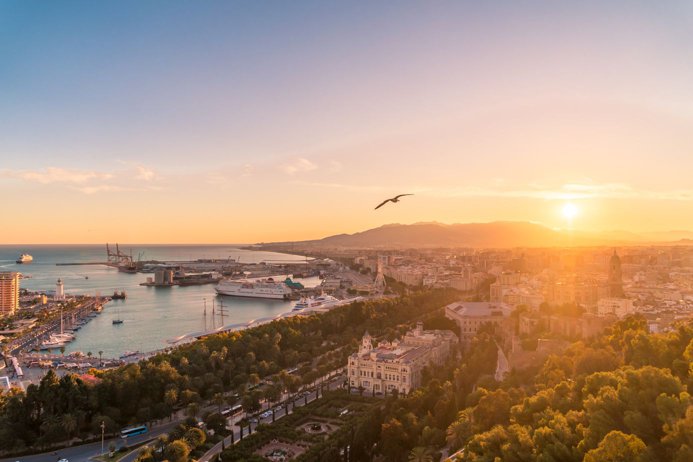Spain Golden Visa programme in 2024

Golden Visa is an unofficial name for a special government programme that provides foreigners with a residence permit or permanent residence for investment in the country’s economy.
The Golden Visa differs from other resident visas. This is a special status for investors allowing them to obtain a residence permit under a simplified conditions. It is important that the Golden Visa holders do not have to become local tax residents if they spend less than 180 days of a year in Spain and they can still have residence rights for the following year. The Spanish programme for providing residence-for-investment was enacted in October 2013, and today the Golden Visa of Spain is the most popular in Europe.
The Spanish Golden Visa allows investors and their families to travel freely within the EU zone. This visa also gives investors the right to relocate to Spain with their families.
Ways to obtain a Spanish Golden Visa
- Buying residential property in Spain worth at least 500,000 euros. It is necessary to own the property for five years, after which time it can be sold.
- Depositing 1 million euros in a Spanish bank for five years.
- Buying and holding 1 million euros worth of stocks from a Spanish company for at least five years.
- Putting at least 2 million euros into Spanish public bonds (the securities have a maturity period of at least five years).
- Proposing a business project that will create jobs or fuel the country’s economic development/ innovation.
It is worth noting that in all these cases, the residence permit remains valid only if the initial investment is preserved. In case of sale of property or withdrawal of the amount from the deposit, the Golden Visa is automatically cancelled.
Important: Under Spain’s Golden Visa programme, investors can recover any of the above contributions after five years.
The programme’s advantages
Freedom of travel. Spanish residence permit holders can travel freely in the Schengen Area.
The right to run a business. The Golden Visa allows an investor to work and do business in Spain.
Possibility to open bank accounts in Spain and the EU. Upon obtaining residency, the investor has the right to open an account in local banks and use all available financial offers of the selected bank.
No permanent residency requirements. Holders of a regular Spanish residence permit must remain in the country for at least 183 days a year for it to remain valid, while those with an investment visa must only spend at least seven days a year in Spain for it to remain valid. However, if the investor wants to obtain permanent residency and Spanish citizenship, it is necessary to live continuously in the country.
Residency for the entire family. National residence permits are issued to the investor, their spouse, and minor children (under 18). The investor’s parents and children over the age of 18 can also be included in the application if physically/financially dependent on the main applicant.
The possibility of obtaining Spanish citizenship. After 10-years-long residency in Spain, the investor has the right to apply for a passport of this country.
Medical treatment. Under Spain’s “Cuadro médico sin copago” health insurance scheme, services including doctor’s appointments, ambulance call-outs, hospitalisation, treatment, and surgical service are available for free.
EU driving licence. The investor can buy and register an automobile.
School and university education for children. The investor’s children can study in the country’s public and private schools, as well as receive higher education.
No tax residency in Spain. The investor has no obligation to submit tax returns if they stay no longer than 183 days a year in the country.
No need to pass exams. It is not compulsory to speak Spanish or take an exam about the country’s history.
Requirements for obtaining a residence permit for investing in property in Spain
In order to obtain a Spanish residence permit, an investor has to:
- Buy a property in Spain worth 500,000 euros. One can choose to purchase a land plot, residential or commercial property. It is allowed to purchase several objects, the value of which in total exceeds half a million euros.
- Have documentary evidence that the applicant’s own funds were used for the investment. This means that the amount of investment is already in the account of a potential investor.
- The purchased property must be registered with the title deed (Escritura de Compraventa). Hence, it is not possible to apply for the Golden Visa after an investment in an under-construction project.
How to apply for the Golden Visa programme in Spain?
To obtain resident status for investments in 2024, an investor is required to submit documents while already in Spain.
Application requirements
The applicant must be over 18 years old and invest in the Spanish economy and keep the investment for the duration of the visa. It is also necessary to confirm financial well-being, the applicant’s own income sufficient to live in the country.
The minimum requirements for confirming financial solvency are 28,800 euros in the investor’s account and 7,200 euros for each family member annually.
The applicant will also need:
- to confirm that the funding sources are legal;
- to have no criminal record in the last five years;
- to have no debts to the tax service in Spain;
- to have no visa violations and restrictions on entry into the EU;
- to be not included in the EU sanctions lists;
- to pose no threat to national security;
- to have no infectious diseases.
Documents required to apply for investment-based residency
- valid international passport with a validity period at least one year from the end of the intended period of residence permit;
- personal ID;
- application for a residence permit;
- two colour photos of 3.5×4.5 mm;
- contract for the purchase of property in Spain or a document confirming a different type of investment;
- bank account statements, documents on the availability of deposits;
- Spanish TIN;
- marriage certificate;
- certificate of no criminal record with notarized translation;
- medical certificate proving absence of infectious diseases;
- medical insurance that covers the entire validity period of the visa and is concluded with a Spanish company;
- documents confirming the legal sources of income: certificates, bank statements, lease or sale agreements of overseas property;
- receipt of payment of fees and taxes.
All documents received outside Spain require an apostille and legal translation to Spanish.
Nine steps to obtain the Spanish Golden Visa
- Risk assessment. Consult with Tranio’s immigration specialist, assess all potential risks and investment prospects.
- Property selection. It is possible to view the property remotely with an online demo or attend a property shower in person if the investor has an open Schengen visa.
- Reservation of the property. Here the buyer is expected to make a deposit of 10% of the property value and sign an initial contract for reservation.
- Obtaining a Spanish TIN and preparing documents. On behalf of the investor, this part of the transaction in Spain is handled by a trusted lawyer from among the company’s partners.
- Signing of the final contract. On this step, the remaining amount is paid and the final documents are signed.
- Obtaining a tourist visa in Spain. It is necessary to enter Spain in order to obtain a residence permit as an investor. The supporting documents have to be collected and transferred to the Spanish consulate in the applicant’s country of residence.
- Applying for a residence permit. The proceedings on the residence permit begin when the investor comes to Spain. It is necessary to submit biometric data, fill out government forms, pay taxes and fees. The later administrative proceedings can be trusted to an attorney chosen among the company’s partners, or investors may choose to complete the process personally.
- Obtaining an investor’s residence permit. The investor receives a ready-made permit for a long-term stay in Spain valid for 2 years. The ID issue takes 20 days or more. The issued card can be collected from the police office.
- Extension of residence permit. It is necessary to contact the migration service for extending the status of a Spanish resident at least 60 days before the expiration of the current permit. The main condition is the preservation of the ownership for initial investment property in its entirety.
Volume of foreign investment in Spanish property by country in 2023
Nationality | 2023 |
Great Britain | 8,327 |
Germany | 6,350 |
France | 5,824 |
Morocco | 4,711 |
Belgium | 4,649 |
Italy | 4,570 |
Romania | 4,398 |
Netherlands | 4,228 |
Poland | 3,123 |
Russia | 2,728 |
Source: Indice Registral Actividad Inmobiliaria
The costs of obtaining a residence permit
Main expenses of the investor in addition to the costs of purchasing property:
Legal expenses. Depending on the number of applicants, the total amount may vary from 1,000 to 4,000 euros. This includes professional consultations, legal support, documentation preparation, apostille and translation of all documents by sworn translators.
Medical insurance. It can cost from 50 to 100 euros per person.
Expenses when buying property. They make up 10–15% of the property value.
State fees for applying for a residence permit. They amount to 100 euros per person for issuing a plastic residence permit card.
Permanent residency in Spain
Immigrants who have lived in Spain for five years are eligible for permanent residency. Applicants must prove that they have not left the country for more than 10 months within those five years. Permanent Spanish residency gives holders the same rights as full citizens, apart from the right to vote and be elected into the political system.
Spanish citizenship
Spanish citizenship can be obtained on regular grounds. It is possible to apply for Spanish citizenship after 10 years of residency in the country. Applicants need to obtain a temporary residence permit first and become a permanent resident five years later. Five years after receiving the status of a permanent resident it is possible to apply for Spanish nationality. To be granted this, applicants need to first pass Spanish language and history exams.
Spain prohibits dual nationality so applicants are required to renounce their birth citizenship before being issued a Spanish passport. There are only a few exceptions that mostly apply to citizens of Latin American countries.
The Tranio team will choose the optimal property for the Golden Visa of Spain according to your requests.
Contact us
Frequently asked questions about the Golden Visa of Spain
- buy property in Spain from 500,000 euros;
- put 1 million euros on deposit in a Spanish bank;
- buy shares in Spanish companies worth at least 1 million euros;
- invest at least 2 million euros in Spanish government bonds;
- propose a business project that contributes to job creation, economic development or innovation.
The whole process from choosing and buying property to obtaining a residence permit card takes a maximum of 6 months.
To apply for the Golden Visa, you do not need to reside in Spain. However, at the moment, an application for the Golden Visa is only possible in Spain. For entering the country, it is enough to open a short-term tourist visa.
- valid international passport with a validity period of at least one year from the end of the intended period of residence permit;
- personal ID;
- application for a residence permit;
- two 3.5x4.5 mm colour photos;
- a contract for the purchase of property in Spain or a document confirming a different type of investment;
- bank account statements, documents on the availability of deposits;
- Spanish TIN;
- marriage certificate;
- certificate of no criminal record with a notarized translation;
- medical certificate of absence of infectious diseases;
- medical insurance that covers the entire validity period of the visa and is concluded with a Spanish company;
- documents confirming the legality of income: bank statements, lease or purchase agreements of property;
- receipt of payment of fees and taxes.
The minimum investment amount for obtaining the Golden Visa is 500,000 euros when buying property. At the same time, several objects can be purchased for this amount.
Among the main advantages are: open borders and unlimited stay in the Schengen area, the possibility of working and doing business in the EU, opening European accounts, high-quality medicine, access to European universities.
Yes, after living in the country for 10 consecutive years a resident is eligible for Spanish citizenship. To get a passport as an investor, one has to get the Golden Visa, live in the country for five consecutive years and then apply for permanent residence. In another five years, one can apply for Spanish citizenship.
Yes, the spouse and minor children can receive resident rights together with the main investor. Parents and adult children can also be included in the application, if they are dependent on the main applicant.
We will send you a content digest not more than once a week

















.jpg)

